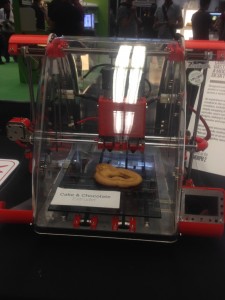

Dr Beukes (CEMIS, US), Dr S Bachmann (BU) and Prof Liebenberg (CEMIS, US)
Latest research and knowledge exchange news at Bournemouth University


Dr Beukes (CEMIS, US), Dr S Bachmann (BU) and Prof Liebenberg (CEMIS, US)
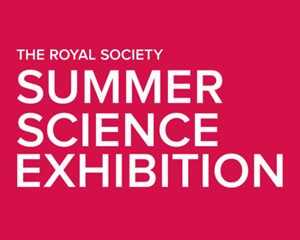 The Royal Society is looking for brilliant science and scientists to feature at the Summer Science Exhibition 2018.
The Royal Society is looking for brilliant science and scientists to feature at the Summer Science Exhibition 2018.
The Exhibition features the UK’s most inspiring research and is a chance for scientists to showcase their work to over 14,000 people, including everyone from school children and families to MPs and Fellows of the Royal Society. Exhibitors are supported throughout the process and get dedicated support, advice and guidance from our Exhibition team.
It’s a great event to be part of, but as our motto (Nullius in verba) urges, don’t take our word for it. A 2017 exhibitor said:
“The whole week of the exhibition was fabulous. All our team thoroughly enjoyed the event and it has been a memorable experience for us. We have learned a lot from this.”
The call for proposals closes on 1 September 2017 and the Exhibition will run from 2 – 8 July 2018.
If you are interested in finding out more or applying, please visit this website: https://royalsociety.org/science-events-and-lectures/2017/summer-science-exhibition/proposals/.
Please direct all enquiries to exhibition@royalsociety.org.
MS is a chronic debilitating and progressive condition that affects the fatty tissue sheath surrounding nerves. Incomplete innervation due to loss of the myelin sheath is largely responsible for uncoordinated movements. Brain temperature fluctuations are also often seen in people with MS together with fatigue when carrying out mentally or physically demanding tasks. These are commonly associated with excessive yawning yet the cause of fatigue in MS is not well understood.
A recently completed study asked participants to produce saliva into a small tube so that their cortisol levels could be analysed. They were also asked to look at presentations that provoked a yawning response. Results revealed that all of the participants had elevated cortisol levels after yawning and that there was a marked difference in cortisol levels between the healthy participants and those with MS.

Yawning: Pynq Thompson aged 28 days
Thompson Cortisol Hypothesis (Ref.1) proposes threshold levels of cortisol trigger the yawn response which lowers brain temperature. Correlation between brain temperature and cortisol is to be further examined together with comparison between UK and Norwegian participants with MS since the incidence of MS is greater in Scandinavian countries (and Canada and Scotland) possibly due to vitamin D and K reduction with reduced sunlight.
Previous studies have examined electromyograph (EMG) activity during yawning and manipulation of conditions to provoke yawning (Refs. 2,3). Brain regions and cortisol activity has been identified in MS in an international study (Ref. 4); and a new understanding proposed of communication between the motor cortex and brain-stem (Ref.5).

Yawning EMG “envelope” of activity
A funding bid is being prepared to examine the feasibility of producing the early detection of MS and cortisol-insufficiency syndromes using observed yawning frequency and cortisol levels.
Simon B N Thompson is Associate Professor, Bournemouth University; Visiting Professor, Université Paris Ouest Nanterre La Défense, France. Member of International Scientific Council for Research into Multiple Sclerosis following presentation to French Ambassador, His Excellency Bernard Emié, French Embassy.
Acknowledgements
Thanks to all volunteers; Alister Coleman and Nicola Williams for assisting in data collection and analysis; Rod Slip, Group Co-ordinator and Kay Bundy, Fundraising Co-ordinator of the MS Society Osborne Centre for providing free facilities.
Note
The author would welcome interest in collaborating in writing bids for funding international work.
References
1. Thompson, S.B.N., 2011. Born to yawn? Cortisol linked to yawning: a new hypothesis. Medical Hypotheses, 77, 861-862.
2. Thompson, S.B.N., & Bishop, P., 2012. Born to yawn? Understanding yawning as a warning of the rise in cortisol levels: randomized trial. Interactive Journal of Medical Research, 1(2), e4, 1-9, doi: 10.2196/ijmr.2241.
3. Thompson, S.B.N., Frankham, C., & Bishop, P., 2014. The art of capturing a yawn using the science of nerve impulses and cortisol levels in a randomized controlled trial. Thompson Cortisol Hypothesis as a potential predictor of neurological impairment. International Journal of Arts & Sciences, 7(3), 529-543.
4. Thompson, S. B. N., Daly, S., Le Blanche, A., Adibi, M., Belkhiria, C., Driss, T., de Marco, G., 2016. fMRI randomized study of mental and motor task performance and cortisol levels to potentiate cortisol as a new diagnostic biomarker. Journal of Neurology & Neuroscience, 7(2); 92: 1-8.
5. Thompson, S.B.N., 2017. Hypothesis to explain yawning, cortisol rise, brain cooling and motor cortex involvement of involuntary arm movement in neurologically impaired patients. Journal of Neurology & Neuroscience, 8(1); 167: 1-5.
The deadline has been extended to the 14th of April , 2017.
This is a call for papers for the Special Session on Machine Learning in Medical Diagnosis and Prognosis at IEEE CIBCB 2017.
The IEEE International Conference on Computational Intelligence in Bioinformatics and Computational Biology (IEEE CIBCB 2017) will be held at the INNSIDE Hotel, Manchester from August 23rd to 25th, 2017.
This annual conference has become a major technical event in the field of Computational Intelligence and its application to problems in biology, bioinformatics, computational biology, chemical informatics, bioengineering and related fields. The conference provides a global forum for academic and industrial scientists from a range of fields including computer science, biology, chemistry, medicine, mathematics, statistics, and engineering, to discuss and present their latest research findings from theory to applications.
The topics of interest for the special session include (but are not limited to):
Up-to-date information and submission details can be found on the IEEE CIBCB 2017. The submission deadline is the 14th of April, 2017.
Please e-mail srostami@bournemouth.ac.uk with any questions.
Date: Friday 24 March 2017
Time: 10.00 am – 5pm
Venue: EB708, Executive Business Centre, Bournemouth University
The event is free to attend, however, places are limited and registration is required.
About the Event:
Additive Manufacturing or 3D printing as it is more commonly known, continues to push the boundaries of Intellectual Property (IP) law whilst raising questions relating to the protection and exploitation of IP.
There have been various attempts to address these questions through legal and empirical studies; yet at the same time, there continues to be limited literature and debate on the implications of 3D printing surrounding IP law, industry, society, technology and policy.
This challenge, which extends to the lucrative jewellery sector raises further questions in relation to creativity, design, copyright and licensing and these issues will be addressed at the event by bringing together experts from the cultural and business sectors including designers, manufacturers, distributors, policy makers and legal professionals.
This multi-disciplinary event which will explore the above issues will also provide the platform for a discussion of the ‘Going for Gold’ project carried out by researchers at CIPPM (Bournemouth University) in collaboration with Museotechniki Ltd and Uformia AS and will be complemented by a demonstration of 3D printed jewellery artefacts resulting from the project.
The event, based on the ‘Going for Gold’ project led by Professor Dinusha Mendis, is supported by the RCUK funded Centre for Copyright and New Business Models in the Creative Economy (CREATe), AHRC Grant Number AH/K000179/1 and builds on the BU/CIPPM-led UK Intellectual Property Office (UKIPO) Commissioned Study on 3D Printing and IP law completed in 2015.
Confirmed Participants and Speakers:
Mark Bloomfield (Electrobloom); Roger Brownsword (Bournemouth University / Kings College London); Ruth Burstall (Baker & McKenzie LLP); Frank Cooper (Jewellery Industry Innovation Centre, Birmingham Jewellery School); Lionel Dean (De Montfort University); Damian Etherington (Ipswich Museum); Nikolaos Maniatis (Museotechniki Ltd); Dids McDonald (Anti Copying in Design); Dinusha Mendis (Bournemouth University); Cherie Stamm (Uformia AS); Andrea Wallace (CREATe, University of Glasgow); Michael Weinberg (Shapeways Inc).
For inquiries, please contact Dinusha Mendis at dmendis@bournemouth.ac.uk
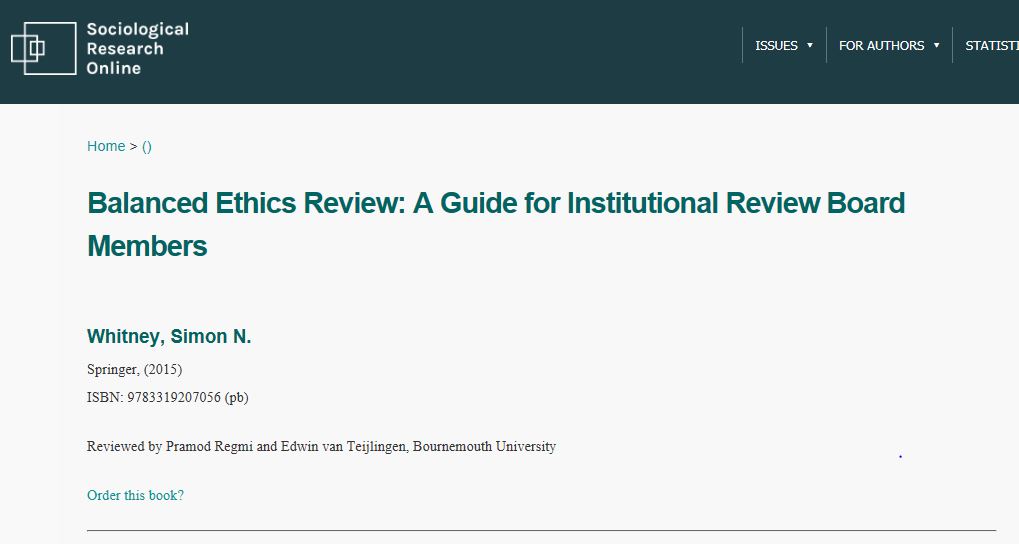 This week saw the publication of the latest issue of the internet-based journal Sociological Research Online. In this issue Dr. Pramod Regmi and Prof. Edwin van Teijlingen published a book review of Balanced Ethics Review: A Guide for Institutional Review Board Members written by the American academic Simon Whitney. [1] In doing so they continue the tradition of FHSS scholars contributing to the research ethics debate. For example, Regmi and colleagues recently had a paper accepted on their insights into research in low-income countries in the journal Developing World Bioethics.[2] Whilst a 2012 FHSS-led paper stressed that researchers conducting research in low-income countries need to apply for research ethics approval to the relevant local authority, if national legislation requires one to do so.[3]
This week saw the publication of the latest issue of the internet-based journal Sociological Research Online. In this issue Dr. Pramod Regmi and Prof. Edwin van Teijlingen published a book review of Balanced Ethics Review: A Guide for Institutional Review Board Members written by the American academic Simon Whitney. [1] In doing so they continue the tradition of FHSS scholars contributing to the research ethics debate. For example, Regmi and colleagues recently had a paper accepted on their insights into research in low-income countries in the journal Developing World Bioethics.[2] Whilst a 2012 FHSS-led paper stressed that researchers conducting research in low-income countries need to apply for research ethics approval to the relevant local authority, if national legislation requires one to do so.[3]
Looking better a little further back, Professor Emerita Immy Holloway wrote about the researcher who may have (potentially) conflicting roles namely those of researcher and health care professional.[4] Whilst a combination of midwifery researchers in the Centre for Midwifery, Maternal & Perinatal Health (CMMPH) highlighted the problems faced by practitioners doing research in their field of practice with perhaps the risk of blurring professional and research ethics, as balancing competing ethical concerns between protecting research participants and over-managing the ethical process can be problematic.[5-6] The latter issue of management and regulation of research ethics has recognised as getting more and more cumbersome and bureaucratic.[7-8]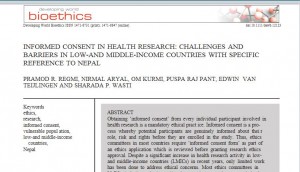
Two further publications by Prof. Ashencaen Crabtree have added to the pool of FHSS publication on research ethics.[9-10] The first one, a book, addressed the problematic issue of gate-keepers in research together with the ethics of critical observation of abuse (potential or actual), as well as the ethics of advocating on behalf of research participants.[9] The second paper covered issues around working with research participants who are regarded as ‘vulnerable’ in a study into the context of care and patient/service user experiences.[10]
Whilst Prof. Parker has highlighted the benefits and dangers of using email and the Internet for social and health research.[11] An even newer research approach is the use of discussion boards as sources of data, which brings its own ethical dilemmas.[12]
In 2010-11 Prof. Parker and colleagues explored in two separate papers the contested meanings and difficulties associated with informed consent, highlighting challenges raised by an almost unquestioned acceptance of biomedical research ethics in social research and questioning whether potential ‘harm’ is different in this context.[13-14]
Prof. Hundley and colleagues discussed the ethical challenges involved in conducting a cluster randomised controlled trial, where getting informed consent can be complication.[15] Whilst it is worth reminding researchers that in issues of informed consent during pregnancy and childbirth one has to consider the potential for harm to two participants.[16]
References
Recent BU graduate Dr Pratik Adhikary is currently working alongside BU researcher Professor Edwin van Teijlingen and the Centre of Midwifery, Maternal and Perinatal Health (CMMPH) in Nepal.
The CMMPH have been working on improving maternity care in Nepal for a number of years. They’ve most recently begun looking at the impact of women’s groups on maternal and child health uptake in Pharping- rural Nepal.
A former BU PhD student, Dr Adhikary is in charge of planning and monitoring the study, as well as training local Nepalese data collectors. He also looks after the data entry and the overall evaluation of the study.
As well as this, Newton funding is offering him his first fieldwork post as an independent researcher. Below we follow his journey from a former BU student to a BU staff member.
“I’m originally from Nepal and came to Bournemouth University in 2009 to study for my PhD. This looked at Nepalese migrant workers working in the Middle East and Malaysia – this focused on their physical and mental health, as well as any risks they took in their jobs. Previously, I studied for an MSc in Public Health at the University of Aberdeen, as well as working as a cardiac data collection officer in Aberdeen Royal Infirmary,” says Dr Adhikary.
“Studying at BU was very important for my academic career. I was lucky enough to present my PhD study at an international conference, which provided me with useful feedback from both academics and early career researchers,”
“My academic supervisors Prof van Teijlingen and Dr Steven Keen were instrumental throughout my PhD- in gaining a partial fee waiver, international travel funds to attend conferences and arranging a grant from the open society foundation,”
“As a young researcher, I am planning a number of drafts for publication in 2017. Support from my BU colleagues has given me a unique stepping stone in the academic world,”
“Being at BU has enabled me to grow my researcher’s network and provided me with an insight into the some of the highest quality of research in the world,” says Dr Adhikary, “I’ve always felt at home at BU and I’m keen to continue my research career here! “
You can read one of Dr Adhikary’s PhD papers online for free here
Dr Adhikary was also a co-author on this recent 2016 paper on the BU Research Blog
The deadline has been extended to the 14th of April , 2017.
This is a call for papers for the Special Session on Machine Learning in Medical Diagnosis and Prognosis at IEEE CIBCB 2017.
The IEEE International Conference on Computational Intelligence in Bioinformatics and Computational Biology (IEEE CIBCB 2017) will be held at the INNSIDE Hotel, Manchester from August 23rd to 25th, 2017.
This annual conference has become a major technical event in the field of Computational Intelligence and its application to problems in biology, bioinformatics, computational biology, chemical informatics, bioengineering and related fields. The conference provides a global forum for academic and industrial scientists from a range of fields including computer science, biology, chemistry, medicine, mathematics, statistics, and engineering, to discuss and present their latest research findings from theory to applications.
The topics of interest for the special session include (but are not limited to):
Up-to-date information and submission details can be found on the IEEE CIBCB 2017. The submission deadline is the 14th of April, 2017.
Please e-mail srostami@bournemouth.ac.uk with any questions.
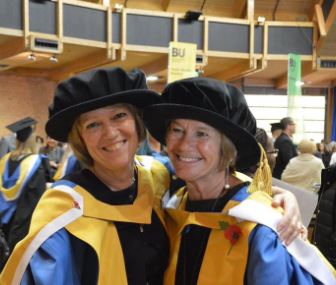 Alongside Bournemouth University’s midwifery and other health and social care students who graduated in last Friday’s ceremony, BU honoured prominent midwife Sheena Byrom OBE with an Honorary Doctorate for her services to the profession. Sheena Byrom gave an inspiring speech at Friday’s Graduation. Sheena said, “If they can keep in their hearts the passion and the drive they had when they first came to the university, it will help them to be more resilient and keep them motivated towards what they want to do. Healthcare is a blend between love and science and both are equally important. In practice, it is key that they have the skills, but the things that makes the difference are love and compassion.”
Alongside Bournemouth University’s midwifery and other health and social care students who graduated in last Friday’s ceremony, BU honoured prominent midwife Sheena Byrom OBE with an Honorary Doctorate for her services to the profession. Sheena Byrom gave an inspiring speech at Friday’s Graduation. Sheena said, “If they can keep in their hearts the passion and the drive they had when they first came to the university, it will help them to be more resilient and keep them motivated towards what they want to do. Healthcare is a blend between love and science and both are equally important. In practice, it is key that they have the skills, but the things that makes the difference are love and compassion.”
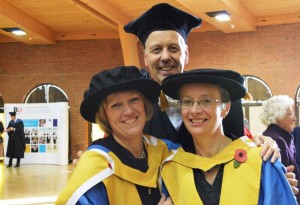 Alongside Sheena two students from the Centre of Midwifery, Maternal & Perinatal Health(CMMPH) graduated with a PhD in Midwifery. Dr. Alison Taylor received her PhD for her qualitative research on breastfeeding. Her thesis is entitled ‘It’s a relief to talk ….’: Mothers’ experiences of breastfeeding recorded on video diaries. Dr. Rachel Arnold was awarded her PhD for her research Afghan women and the culture of care in a Kabul maternity hospital.
Alongside Sheena two students from the Centre of Midwifery, Maternal & Perinatal Health(CMMPH) graduated with a PhD in Midwifery. Dr. Alison Taylor received her PhD for her qualitative research on breastfeeding. Her thesis is entitled ‘It’s a relief to talk ….’: Mothers’ experiences of breastfeeding recorded on video diaries. Dr. Rachel Arnold was awarded her PhD for her research Afghan women and the culture of care in a Kabul maternity hospital.
Congratulations to all BU undergraduates and Rachel, Alison and Sheena!
Prof. Edwin van Teijlingen
CMMPH
Associate Professor in International Law (BU) and War Studies (FHS) Sascha Dov Bachmann just returned from Johannesburg where he presented on Hybrid War and Lawfare at the 1st International Military Law Conference in South Africa. A great experience and and from a media point of view as well as from a BU research point of view the conference and its coverage in the regional African and international media were a full success.
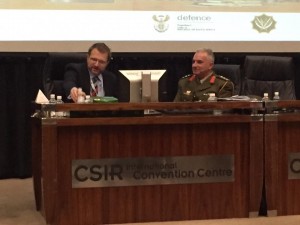
The reference below is taken from the official SA Government Media release and was taken up by various media sites inside the African Union and abroad: the UK, US, Ghana,Kenya, Sudan, NZ etc and reads as follows:
“The rest of the first day (under the sub-theme International Military Law) unpacked issues relating to the permissible and legal use of armed force by States, and the legal rules governing soldiers during such armed conflicts. Professor Sascha-Dominik Bachmann of Bournemouth University in the United Kingdom presented a paper setting out the implications of so-called “hybrid war” and the offensive and defensive use of “lawfare” (the use of litigation for political purposes aimed at impacting a State’s military operations). ”
defenceWeb – Africa’s leading defence news portal summarizes the objectives of the conference as:
The conference theme of “contemporary military law” was explored with sub-themes relating to international military law, human rights law, operational law and administration of military justice.
The objectives of the conference – to raise public awareness of the importance of military law in a democracy and to stimulate interest in academic research in this specialised field of public law to strengthen the development of South African military law – were successfully met with a number of international and local academics and military professionals presenting research papers, according to the South African National Defence Force (SANDF).
The conference was officially opened by SA National Defence Force Chief, General Solly Shoke. In his opening address he welcomed the opportunity provided by the conference for South African military lawyers to benchmark local approaches with that of other armed forces. He also expressed the wish for the conference to provide a basis for evaluating whether any amendments to military and other legislation may be necessary to empower commanders to instil and maintain military discipline.
Do you want to get creative for an hour? Do you have an interest in creative research methods?
14:Live is back on Thursday 17 November with Dr Ashley Woodfall.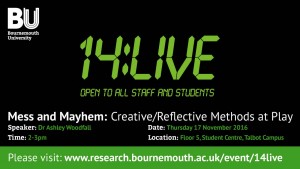
Join us as we get creative and discuss Mess and Mayhem: Creative/Reflective Methods at Play. This mess and discussion led session will be a space to discuss the use (and abuse) of creative research methods. How can they help trigger meaningful research interactions, and how the outcomes might be understood?
This session will be exploring research in a creative environment from drawing, to molding, to improv’ and beyond. We ask if creative reflective methods can share something of your own life world and whether these methods can help unlock metaphorical insights that are missed through more traditional approaches.
Come along on at 14:00-15:00 on Floor 5 of the Student Centre for an hour of mess and mayhem. There will be free drinks and snacks!
If you have any questions then please contact Hannah Jones
Dr Sascha Dov Bachmann, Associate Professor in International Law and Extraordinary Associate Professor in War Studies (Swedish Defence University) will present his work on Hybrid War and law fare in the 21st Century at SANDF’s First International Conference on Military Law, in Pretoria from 1 to 3 November.
The objective of the conference is to expose and bring awareness to the South African public in general and academia in particular on the importance of Military Law within a country’s legal system.
South Africa is among the leading countries in contributing military personnel and major equipment for peace missions in pursuance of its policy to promote peace and stability in the continent. The country’s important role in mediation to end conflicts, has earned it a good standing, reputation and respect among the community of nations.
As an active participant in international structures, South Africa raises the interests of the African continent and other developing countries. Since it plays a meaningful role for the success of the region and the continent, it is incumbent that it stays afloat in every spectrum possible including the development and application of Military Law.
Furthermore here at home, the community at large; to some extent the Military community; academia and jurors alike seem not to be aware of the relevance, extent and application of Military Law.
The Conference will be opened by the Minister of Defence and Military Veterans the Honourable Minister N.N. Mapisa-Nqakula. The Key Note Speaker will be our former Chief Justice, Justice Sandile Ngcobo.
Dr Sascha Dov Bachmann will present the findings on an ongoing project on Hybrid War and lawfare and how it impacts on AU states and their operational capacities and abilities.
FHSS PhD student Preeti Mahato in the Centre for Midwifery, Maternal & Perinatal Health (CMMPH) has been awarded a funded place on the COST Action Training School BEYOND BIRTH COHORTS: from study design to data management. This training school will run from 23-15 November in Spain.
 COST (European Cooperation in Science and Technology) is a unique platform where European researchers can jointly develop their ideas and initiatives across all scientific disciplines through trans-European networking of nationally funded research. Preeti pal has been awarded the sum of 500 euro to cover the cost of attending the Training School and travel and accommodation costs. Preeti’s PhD project is on maternity care provision in Nepal. Preeti’s research focuses on the quality and equity of service available at birthing centres. In Nepal, birthing centres act as first contact point for the women seeking maternity services especially the basic obstetric care. She is supervised by Dr. Catherine Angell, Prof. Edwin van Teijlingen and BU Visiting Faculty Prof. Padam Simkhada (based at Liverpool John Moores University).
COST (European Cooperation in Science and Technology) is a unique platform where European researchers can jointly develop their ideas and initiatives across all scientific disciplines through trans-European networking of nationally funded research. Preeti pal has been awarded the sum of 500 euro to cover the cost of attending the Training School and travel and accommodation costs. Preeti’s PhD project is on maternity care provision in Nepal. Preeti’s research focuses on the quality and equity of service available at birthing centres. In Nepal, birthing centres act as first contact point for the women seeking maternity services especially the basic obstetric care. She is supervised by Dr. Catherine Angell, Prof. Edwin van Teijlingen and BU Visiting Faculty Prof. Padam Simkhada (based at Liverpool John Moores University).
Preeti has already published the first PhD paper ‘Birthing centres in Nepal: Recent developments, obstacles and opportunities’ in the Journal of Asian Midwives (JAM) [1], whilst another was published in the Nepal Journal of Epidemiology [2]. Furthermore, a more general health and development paper was published this year in Health Prospect [3].
Congratulations!
Prof. Edwin van Teijlingen
CMMPH
References:
Dr Simon Dyall’s Lipid Neurochemistry lab conducts research investigating the therapeutic neuroprotective potential of bioactive lipids. The latest study is a collaboration with Dr Laura de Rooy, Consultant Neonatologist at St George’s Hospital, London, the University of Roehampton and Bournemouth University, and has just been published in the journal, Clinical Nutrition.
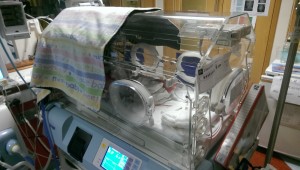 Recent advances in neonatal care have led to improved survival rates for preterm infants, but this has led to greater challenges in providing these survivors with adequate nutrition. Docosahexaenoic acid (DHA) and arachidonic acid (ARA) are dietary fats essential for optimal brain growth and development. During the last trimester the placenta provides the foetus with high levels of DHA and ARA and extremely preterm infants, born at less than 28 weeks, are therefore at the greatest risk of deficiency as this supply has been cut short. In this new study the DHA and ARA intakes of extremely preterm infants was measured from all sources over the first six weeks of life and compared to European intake guidelines and levels provided in utero.
Recent advances in neonatal care have led to improved survival rates for preterm infants, but this has led to greater challenges in providing these survivors with adequate nutrition. Docosahexaenoic acid (DHA) and arachidonic acid (ARA) are dietary fats essential for optimal brain growth and development. During the last trimester the placenta provides the foetus with high levels of DHA and ARA and extremely preterm infants, born at less than 28 weeks, are therefore at the greatest risk of deficiency as this supply has been cut short. In this new study the DHA and ARA intakes of extremely preterm infants was measured from all sources over the first six weeks of life and compared to European intake guidelines and levels provided in utero.
The study extends earlier observations with a more detailed analysis that current feeding practices for extremely preterm infants are likely to lead to severe deficits in DHA, but importantly the study measured ARA intake for the first time, where the results show that deficits of ARA are of a potentially much greater magnitude.
“These observations are really important as we need to ensure that these infants receive the best nutrition to decrease morbidity and improve long-term outcomes. These low levels of intake occurred in spite of the infants receiving breast-milk and the results highlight the need to provide extremely premature infants with additional sources of DHA and ARA.” says Dr Dyall.
Follow-up work is currently underway investigating how intakes of DHA and ARA can be increased to compensate for these early deficits. If you would further information on this research or any of the work undertaken by the Lipid Neurochemistry lab please contact Dr Simon Dyall, sdyall@bournemouth.ac.uk
Reference:
De Rooy, L. and Hamdallah, H. Dyall, S.C. (2016): Extremely preterm infants receiving standard care receive very low levels of arachidonic and docosahexaenoic acids. Clinical Nutrition
The paper can be found at: http://authors.elsevier.com/sd/article/S0261561416312778
Last month’s press release for the latest study in the Centre for Midwifery, Maternal & Perinatal Health (CMMPH) was picked up by the Journal of Family Health. 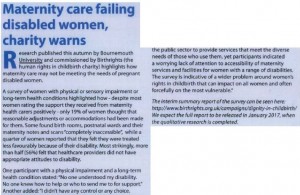 The study ‘Human rights and dignities: Experience of disabled women during pregnancy, childbirth and early parenting’ appeared under the heading ‘Maternity care failing disabled women, charity warns’ in the Journal of Family Health. The charity in question is Birthrights which funded the survey of women with physical or sensory impairment or long-term health conditions and their maternity care experiences. The research was conducted by midwifery researchers Jenny Hall, Jillian Ireland and Vanora Hundley at Bournemouth University and occupational therapist Bethan Collins, at the University of Liverpool.
The study ‘Human rights and dignities: Experience of disabled women during pregnancy, childbirth and early parenting’ appeared under the heading ‘Maternity care failing disabled women, charity warns’ in the Journal of Family Health. The charity in question is Birthrights which funded the survey of women with physical or sensory impairment or long-term health conditions and their maternity care experiences. The research was conducted by midwifery researchers Jenny Hall, Jillian Ireland and Vanora Hundley at Bournemouth University and occupational therapist Bethan Collins, at the University of Liverpool.
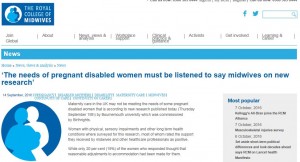 Last month this important study had already been reported by the Royal College of Midwives (RCM) on their webpages (click here to read more). On the RCM website Louise Silverton Director for Midwifery at the RCM said: “It is deeply disappointing to hear that women with disabilities are not getting the maternity care they need and deserve. Although this is only a small survey, it does provide a very valuable insight into the realties of the care these women have received while pregnant. The RCM believes that maternity services should treat disabled women like every other woman, while ensuring that the care provided does not ignore or overreact to their specific wishes and aspirations.”
Last month this important study had already been reported by the Royal College of Midwives (RCM) on their webpages (click here to read more). On the RCM website Louise Silverton Director for Midwifery at the RCM said: “It is deeply disappointing to hear that women with disabilities are not getting the maternity care they need and deserve. Although this is only a small survey, it does provide a very valuable insight into the realties of the care these women have received while pregnant. The RCM believes that maternity services should treat disabled women like every other woman, while ensuring that the care provided does not ignore or overreact to their specific wishes and aspirations.”
Congratulations!
Prof. Edwin van Teijlingen
CMMPH
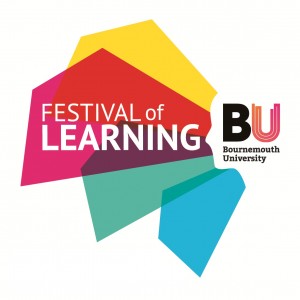 Representing a wonderful celebration of learning, the Festival showcases BU’s research and expertise to a wide and varied audience, including local communities, staff, students, employers and alumni around the world. Read on to find out how you can be involved in 2017!
Representing a wonderful celebration of learning, the Festival showcases BU’s research and expertise to a wide and varied audience, including local communities, staff, students, employers and alumni around the world. Read on to find out how you can be involved in 2017!
After a hugely successful pilot in 2016, which saw BU’s established Festival of Learning go global in both China and Malaysia, we are delighted to announce that the global Festival of Learning will return for a second year. Three distinct weeks of exciting events will take place to showcase global Fusion in ASEAN, India and China from March – May 2017.
Celebrating its fifth anniversary, the Festival of Learning will run in Bournemouth from 8-12 July 2017, with a vibrant opening family weekend and a diverse selection of events throughout the week. The Festival will conclude with a global day on 12 July to celebrate the fantastic array of events and learning taking place around the world as part of the Festival of Learning.
Prior to putting forward an event proposal all applicants are advised to read the full details for both the UK Festival of Learning and the global Festival of Learning, which outline the scope and objectives of the festivals.
Once you are ready to submit your event proposal you will need to complete the online application form. Applications for both the global Festival of Learning and the UK Festival of Learning will be handled via one form. The form can be saved and edited up until the point you submit. To help make the process as easy as possible we have also provided a planning document that includes a list of questions and requested response lengths.
Find out more, download the planning document and take a look at dates for our drop-in sessions.
If you have any questions about the global Festival of Learning, please contact the Global Engagement Hub: 01202 965112 globalbu@bournemouth.ac.uk
If you have any questions about the UK Festival of Learning, or difficulties using the online application form, please contact the Festival of Learning Team: 01202 961342 FoL@bournemouth.ac.uk
As part of our ongoing commitment to celebrating awarded competitive research projects we are pleased to announce a new monthly post that will provide information about recently awarded grants.
Project Title: Development of a tranining program for the improvement of quality of life of persons with alzheimer through “serious games”.
Principle Investigator: Ben Hicks
Project Description: Ben Hicks, Jan Wiener (Bournemouth University Dementia Institute and Psychology Department) and Wen Tang (Department of Creative Technology) will be working in collaboration with 5 European partners across Spain, Slovenia, Romania and Greece to develop and evaluate a training program that supports the use of ‘Serious Games’ for people living with Alzheimer’s Disease. The project has been funded by the European Commission Erasmus+ and will run for two years starting in September 2016. The research aims to work in collaboration with people living with Alzheimer’s Disease to develop ‘serious games’ and technological training that will promote their Quality of Life. The specific objectives of the study are:
Project Title: Activities for schools and the general public, and continuation of research of the rare aquatic habitats inthe East Stoke area (Dorset).
Principle Investigator: Genoveva Esteban
Project Description: This project will enable the continuation of world-class research into the microbial communities of the rare aquatic habitats in the East Stoke area near Wareham (Dorset). The scientific community in general will benefit from this research through discoveries that will be published in specialised peer-reviewed journals. The project also aims at embedding outdoor activities into first and second schools’ Curriculum in order to;
Other benefits are to inspire school children to have an interest in the life sciences; reveal the wondrous life of organisms hidden from the naked eye; and last but not least, to engage with the general public to highlight the importance of protecting natural aquatic habitats.
Project Title: 2016 Referendum Analysis: media, voters and the campaign
Principle Investigator: Dan Jackson
Project Description: We are very pleased to announce the publication of “EU Referendum Analysis 2016: Media, Voters and the Campaign”, edited by Daniel Jackson, Einar Thorsen (both BU) and Dominic Wring (Loughborough University).
Featuring 80 contributions from 100 leading UK academics, this publication captures the immediate thoughts, reflections and early research insights on the 2016 Referendum on UK Membership of the European Union from the cutting edge of media and politics research.
Published 10 days after the election, these contributions are short and accessible. Authors provide authoritative analysis of the campaign, including research findings or new theoretical insights; to bring readers original ways of understanding the referendum and its consequences. Contributions also bring a rich range of disciplinary influences, from political science to fan studies, journalism studies to advertising.
For more information on this project please visit the following BU Research Blog posts.
BU academics launch EU Referendum Analysis report within ten days of the vote
Project Title: Understanding the barriers and facilitators to implement and embed a new procedure for nurses on good nutritional care in older people living in community settings.
Principle Investigator: Jane Murphy
Project Description: Dr Jane Murphy has been awarded a grant from the Burdett Trust to examine the issue of malnutrition in older people. Malnutrition continues to be a real problem for the UK’s ageing population, with more than 3 million people thought to be at risk. Around 93% of these are people living in the community, where it may be harder for health professionals to spot and diagnose malnutrition.
The aim of this new 18 month study is to develop a new procedure to help community nurses to deliver good nutritional care in the community. The team intend to deliver training to embed this new procedure and evaluate its success and any barriers or enablers for its implementation.
The project is a collaboration between Bournemouth University, the Wessex Academic Health Science Network (WAHSN) and Southern Health NHS Foundation Trust. The team aim to work with the local community – both older people and nursing staff – to carry out their research.
In July 2016, Dr. Dinusha Mendis Associate Professor in Law and Co-Director of the Centre for Intellectual Property Policy and Management (CIPPM) disseminated her research on the Intellectual Property (IP) implications of 3D scanning, 3D printing and mass customisation in Southampton, Newcastle and London.
Questioning what the future holds for IP law as a result of technologies such as 3D printing, Dr. Mendis spoke about the research she has conducted for the UK Government (UK Intellectual Property Office) as well as the research she is conducting for her RCUK/AHRC-funded project ‘Going for Gold’ considering the IP implications of 3D scanning, 3D printing and mass customisation of ancient and modern jewellery.
Cross-Hub Workshop on 3D Printing, Southampton Solent University, 5th July 2016
The event titled ‘Cross-Hub Workshop: 3D Printing: Development, Application and its Contribution to Local Economy’ hosted speakers from industry, academia and professional practice thereby presenting the opportunity to explore and discuss the digital opportunities and its potential contribution to local/national economy in the development and application of 3D printing technology.
Dr. Mendis was invited to speak about her research into the intellectual property implications of 3D printing and presented the results from the commissioned research carried out for the UK Intellectual Property Office, which led to the publication of 2 Reports and an Executive Summary in 2015, whilst outlining the copyright, design and licensing implications relating to cultural institutions and SMEs in 3D scanning and printing ancient and modern jewellery.
Fossilisation and Innovation Law, Innovation and Society Research Group of Newcastle Law School, 11th July 2016
At this 2-day event, Dr. Mendis was invited to speak about law’s response to innovation and emerging technologies. Dr. Mendis’ presentation explored law’s resilience to dynamic change, in particular, and questioned whether legislators should adapt to innovation whilst adopting innovative regulation. The 2 day event began with a keynote speech by Professor Dan Faber of UC Berkeley and concluded with a keynote speech by Professor Karen Yeung of Kings College London.
3D Printing in Law and Society Workshop, Information, Law and Policy Centre, Institute of Advanced Legal Studies (IALS) London, 12th July 2016
The event marked the launch of Dr. Angela Daly’s new book on 3D Printing and commenced with a presentation from Dr. Daly, a research fellow at Queensland University of Technology Faculty of Law, Australia. Dr. Daly’s presentation was followed by an invited guest lecture from Dr. Mendis who spoke about the IP implications of 3D printing, highlighting the challenges and opportunities which this technology has brought about, whilst outlining the next steps for 3D printing, from a legal perspective. More information about the event as well a write up about it, can be found here.
